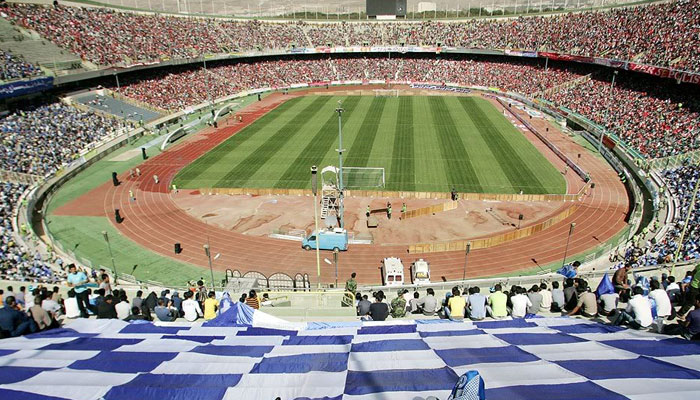Azadi Stadium

Azadi Stadium: A Monument of Iranian Sport located in Tehran, Iran, is one of the most iconic stadiums in the world. It is the national stadium of Iran and is primarily used for football matches. The stadium has witnessed some of the most memorable moments in Iranian football history, and it continues to be a popular venue for events and gatherings. In this article, we will explore the history, architecture, and amenities of Azadi Stadium.
History: Azadi Stadium has a rich history that dates back to the 1974 Asian Games. The stadium has since become a symbol of Iranian football and is deeply ingrained in the country's culture.
Ownership: Azadi Stadium is owned by the Iranian government and is managed by the Physical Education Organization of the Islamic Republic of Iran.
Capacity: Azadi Stadium has a seating capacity of 78,116. It is the fourth-largest stadium in Asia and the largest in Iran.
Famous Matches: Over the years, Azadi Stadium has hosted many famous matches, including the 1974 Asian Games, the 1997 Asian Club Championship final, and the 2002 Asian Games. It has also hosted the national football team's matches and various domestic leagues.
Seating Chart: The stadium has four tiers of seating, with the lower tier being divided into sections A to F. The middle tier is divided into sections G to L, while the upper tier is divided into sections M to R. The stadium also has VIP boxes and press boxes.
Dimensions: The field dimensions of Azadi Stadium are 105 meters by 68 meters. The stadium has a roof that covers the entire seating area.
Tours: Visitors can take guided tours of the stadium, which include a visit to the players' dressing room, the media room, and the pitch.
Construction: Azadi Stadium was constructed between 1968 and 1971, with the help of architects Abdol-Aziz Farmanfarmaian and Max Buchner. The stadium was built to host the 1974 Asian Games and was originally named the Aryamehr Stadium.
Architecture: The stadium's architecture is a blend of traditional and modern styles. The outer facade of the stadium is made of white marble, and the seating area is covered by a concrete and steel roof.
Lighting: Azadi Stadium is equipped with a state-of-the-art lighting system, which provides ample illumination for night matches and events.
Turf: The stadium's turf is made of natural grass and is well-maintained throughout the year.
Events: Azadi Stadium hosts various events, including football matches, concerts, and political rallies.
Major Events: The stadium has hosted many major events, including the 1998 AFC Champions League Final, the 2002 Asian Games, and the 2018 AFC Champions League Final.
Naming Rights: The stadium was originally named Aryamehr Stadium, but its name was changed to Azadi Stadium in 1979 following the Iranian Revolution. "Azadi" means "Freedom" in Persian.
Technology: Azadi Stadium is equipped with the latest technology, including a modern sound system and LED screens.
Amenities: The stadium has numerous amenities, including concession stands, restrooms, and souvenir shops.
Parking: Azadi Stadium has a large parking lot that can accommodate thousands of vehicles.
Security: The stadium has a robust security system to ensure the safety of visitors and attendees.
Food and Drink: Azadi Stadium has several food and beverage outlets that offer a range of snacks and drinks.
Roof: The stadium's roof covers the entire seating area, providing shade and protection from the elements.
Scoreboard: Azadi Stadium has a large scoreboard that displays live scores and game information.
Accessibility: The stadium is easily accessible by public transportation and is equipped with ramps and elevators for visitors with disabilities. The stadium also has designated seating areas for individuals with disabilities.
Azadi Stadium is a significant cultural and sporting landmark in Iran. Its rich history and state-of-the-art facilities make it an iconic destination for football fans and visitors alike. Whether you are attending a match or taking a guided tour, Azadi Stadium offers a unique and unforgettable experience. As it continues to evolve and adapt to modern times, it will remain a symbol of Iranian sport and culture for generations to come.





